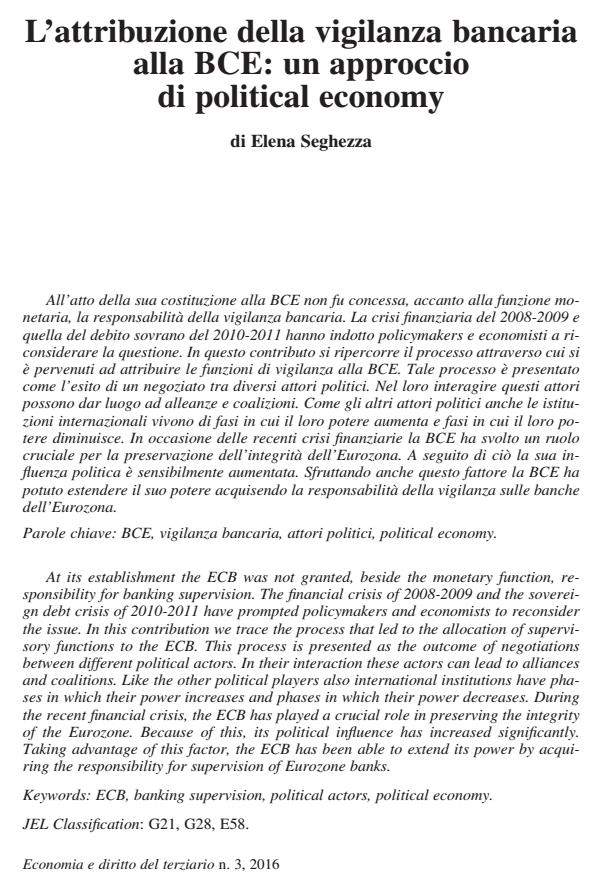L’attribuzione della vigilanza bancaria alla BCE: un approccio di political economy
Titolo Rivista ECONOMIA E DIRITTO DEL TERZIARIO
Autori/Curatori Elena Seghezza
Anno di pubblicazione 2017 Fascicolo 2016/3
Lingua Italiano Numero pagine 0 P. 423-438 Dimensione file 463 KB
DOI 10.3280/ED2016-003005
Il DOI è il codice a barre della proprietà intellettuale: per saperne di più
clicca qui
Qui sotto puoi vedere in anteprima la prima pagina di questo articolo.
Se questo articolo ti interessa, lo puoi acquistare (e scaricare in formato pdf) seguendo le facili indicazioni per acquistare il download credit. Acquista Download Credits per scaricare questo Articolo in formato PDF

FrancoAngeli è membro della Publishers International Linking Association, Inc (PILA), associazione indipendente e non profit per facilitare (attraverso i servizi tecnologici implementati da CrossRef.org) l’accesso degli studiosi ai contenuti digitali nelle pubblicazioni professionali e scientifiche.
All’atto della sua costituzione alla BCE non fu concessa, accanto alla funzione monetaria, la responsabilità della vigilanza bancaria. La crisi finanziaria del 2008-2009 e quella del debito sovrano del 2010-2011 hanno indotto policymakers e economisti a riconsiderare la questione. In questo contributo si ripercorre il processo attraverso cui si è pervenuti ad attribuire le funzioni di vigilanza alla BCE. Tale processo è presentato come l’esito di un negoziato tra diversi attori politici. Nel loro interagire questi attori possono dar luogo ad alleanze e coalizioni. Come gli altri attori politici anche le istituzioni internazionali vivono di fasi in cui il loro potere aumenta e fasi in cui il loro potere diminuisce. In occasione delle recenti crisi finanziarie la BCE ha svolto un ruolo cruciale per la preservazione dell’integrità dell’Eurozona. A seguito di ciò la sua influenza politica è sensibilmente aumentata. Sfruttando anche questo fattore la BCE ha potuto estendere il suo potere acquisendo la responsabilità della vigilanza sulle banche dell’Eurozona.
Parole chiave:BCE, vigilanza bancaria, attori politici, political economy.
Jel codes:G21, G28, E58
Elena Seghezza, L’attribuzione della vigilanza bancaria alla BCE: un approccio di political economy in "ECONOMIA E DIRITTO DEL TERZIARIO " 3/2016, pp 423-438, DOI: 10.3280/ED2016-003005